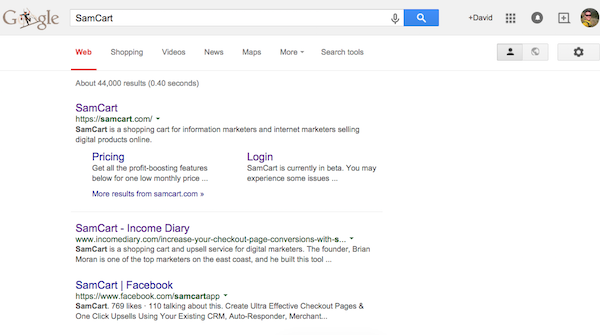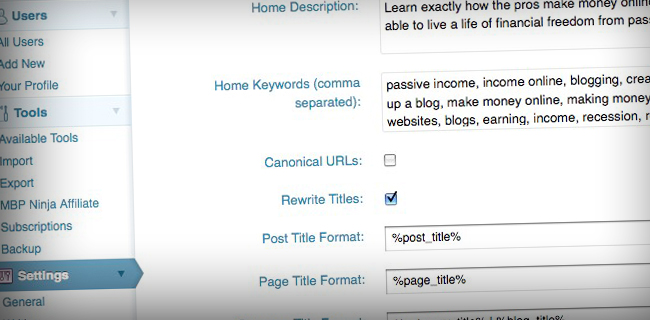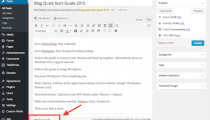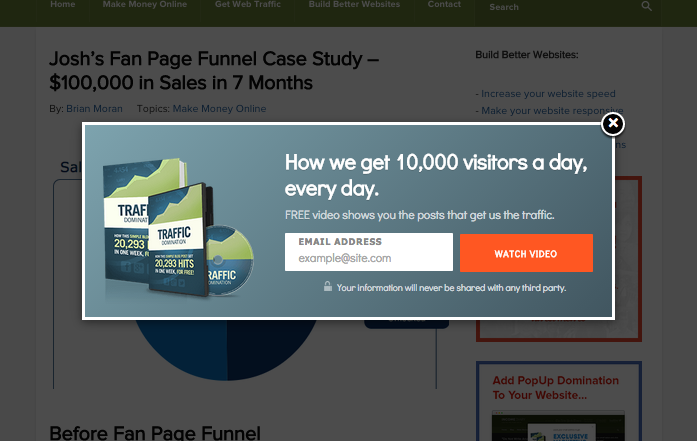How To Google-Proof Your Website
I know, kind of a strange post name, right? Who would want to “Google-Proof” their website? Don’t you want Google to love your website?
The answer is “Yes,” of course you do. What I mean by “Google-Proofing” your website is simply protecting yourself from Google’s algorithm updates — making sure that you never lose any search engine traffic because of an algorithm update.
You are likely aware of Google’s most recent “Panda” update that hammered a lot of huge sites such as EzineArticles, Hubpages, and Mahalo, along with tons of smaller sites (including, unfortunately, one of my own). And I’m sure that at least a few readers of IncomeDiary had their sites hit as well.
The reason for this update was to filter out low quality content from Google’s search results. The reason for this is not to “screw the little guy” or ruin your affiliate earnings — it’s simply a way for Google to help provide it’s customers (meaning, searchers, NOT affiliates or advertisers) with a better search experience. And if they have a better search experience, they are much more likely to use Google again to search — and not defect to another search engine like Bing or Yahoo. And, ultimately, the goal is that the more that people use Google, the more people will click on Google’s ads, making the company more profit.
While this update was a painful experience for a lot of people, it did actually provide some benefits for internet marketers who put in a little extra effort. Specifically, this algorithm update removed a TON of spammy, low quality sites (not every bad site, unfortunately) from the competition. Which means that a lot of keywords that were filled with spammy, low quality sites are now wide open — and ultimately, for the internet marketer who wants to put in a little extra effort to make sure he’s “Google-Proofed,” ripe for the picking.
The truth is this: this is not the last time Google is going to make an algorithm update. If you do not have your site setup properly, then you are putting yourself at risk of losing search engine traffic at any time, basically at the whim of Google. While one might argue that if you are relying on search engine traffic, you are always at the “whim” of Google and are putting yourself at risk — there are ways to mitigate that risk, and prevent your site from being hammered from any future algorithm updates. Not every site got hit by the Panda update — IncomeDiary’s search engine traffic actually has doubled in the past 6 months from 5,000 search engine visitors a week to 10,000 — so what made these sites protected? And what will keep these sites protected in the future?
It all boils down to just a few, specific things.
Guidelines For “Google-Proofing” Your Website
1. More Emphasis on Social Factors
While the jury is still out on Google +1’s success, you better believe that Google is moving more toward social factors like Facebook likes, Tweets, Stumbles and +1’s. If Google making it’s own social network isn’t proof enough to you that Google is focusing more on the social aspects of search, then I don’t know what is. It’s extremely important to have these social buttons on your site, and you want to ESPECIALLY make sure that you have the +1 button setup in a prominent spot so that you can get the most +1’s possible. Google has experimented a ton with re-ranking sites based on how many +1’s they have – and it’s likely that they will continue to put heavy emphasis on boosting sites that have a lot of +1’ed content. Make sure that you are getting your subscribers to “Like” and “+1” your content — do NOT leave this out of your strategy.
2. NO Duplicate Content
This has been a rule for a long time now, though it seems that Google is now much more stringent and penalizing sites more heavily for duplicate content. So make sure your SEO strategy doesn’t rely around duplicate, automated content — because this will NOT work and only get your site penalized in the search engines.
3. LONG, High Quality Content
According to my buddies over at SERPIQ.com, they ran a study of 15,000 keywords, and found that on average the top 10 results for those 15,000 keywords all had over 2,000 words of content on the page that ranked in the top 10. One thing to keep in mind is that it’s not necessarily one 2,000 word article — but 2,000 words of content on the entire page. So for example, on IncomeDiary’s homepage — there are paragraph long previews of posts that add up to over 2,000 words of content — so to Google, it’s a page with over 2,000 words of content. The survey data doesn’t lie – longer content ranks better. Plain and simple. Just make sure that it’s high quality, (i.e. written over an 8th grade level), it has different forms of media if possible (videos, images), and that it gets shared (like I mentioned before!). Ultimately Google wants you to put REAL EFFORT into providing a high quality experience for your website visitors. If you can do that – they WILL reward you with more search engine traffic.
4. Strong Emphasis on On-Site Fundamentals
Again, as Google’s algorithm’s are constantly refined, high quality, useful, and interesting content is always going to be rewarded. However, it’s impossible to have your high quality and interesting content rewarded if your on-site SEO is setup improperly. If Google cannot interpret your content and know exactly what keywords to give you traffic for, then your high quality content will get you ZERO search engine traffic. And sticking to these strong on-site fundamentals will help make sure that your site not only GETS ranked, but it KEEPS it’s rankings through all future algorithm changes.
The real truth is, if you want to rank for high traffic, high profit keywords, you need to make sure that your on-site SEO is up to par (because your competition’s DEFINITELY is). Without proper on-site SEO, you’re building your site without a proper foundation.
“So, where can I learn more and make sure that I’m setting up my site for success in the long term?”
Well, we’ve got a program called The WordPress SEO Blueprint in which my business partner (Tom Lambert) and I go through everything we do and have done to get our WordPress sites ranking at the top of the search engines — and how you can do the same with your own WordPress sites. It’s an incredibly useful and easy to follow resource that will have you ranking your sites at the top of the search engines in no time — and I promise that it will help fully protect you from future algorithm updates.
So check it out, and let us know if you have any questions in the comments section!
"Do Not Write Another Blog Post Until You Watch This Free Video..."

Watch this free video to learn...
- How I got over 10,000,000 people to visit my websites.
- The types of blog post that got me all that traffic.
- How to get someone else to do it for you!














Wow, I can’t believe that one would need to consider “google proofing” a web site. Though it seems crazy, the ideas about content will not only help one to the top, but the site will be a good source of info for the readers.
Thanks for the quality content!
Great post. Panda might seem like a bad thing to some but the reality is that Panda is a good thing and it is all about making the search results better. Social share buttons can be added via wordpress with a simple plugin so it is worth adding them for the sake of 5 minutes work.
Great Post Mike !
Great Contents !! It will be hard time for blogger in future to come on the first page.
I disagree. I think it will be easier in the future to rank, because after long Google has finally leveled the playing field for everyone. Panda was all about that. You put effort, you reap rewards. Doesn’t matter if you are a loner or a corp giant.
Good post which basically sums up how people should build websites. Instead of building them to make money, they should build them to help the reader. One thing that you could have mentioned in this article is how to get traffic from places other than Google (i.e. social media, blogs and forums) so that you are completely “Google-proof”.
Great Article David! Although many people did get hit by the panda update as you said many crap websites were removed which at the end of the day is great for everyone.
High quality content and great on page SEO should be #1 on everybody’s list.
Awesome article David, 2000 words articles are quite impossible to write (atleast for me) but you gave me good idea of adding up more than 2000 words in the homepage.. thanks for that..
I appreciate this post because I always wondered if my site was properly optimized.
All very good advice. I think you’re right on with ragard to social factors.
Very well written article, David.
Apparently, in recent times, there have been dozens of Google updates(Algorithms) with the same intentions as Panda, that are designed to sort out the quality and relevance of content.
The process of optimizing your site posts(Pages) is an ongoing process.
I noticed a number of sites that benefited from the previous update, though, this was in regards to their sites PR going up considerable.
good post, duplicate content definitely will lead you no where has google gives credit to quality & unique content
Great article, David, thanks! I didn’t know about the 2,000 word count, but it seems very reasonable when the intention is quality content. I agree with the suggestion of writing of other traffic sources as a way to truly Google-proof our sites and hope that will be seriously addressed.
Thanks Dave! Fortunately my small website wasn’t affected, but this is one for the bookmarks. When I release my bigger website I will be referring back to this article and taking your advice!
Nice guide. Glad to have steered away from using the article sharing websites to drive traffic now. Heard a lot of bad stories about the panda undate. Although saying that the sites that have dropped down are not that great anyway.
Interesting. I am still wrapping my head around the key word search idea and trying to figure out how to apply that to my website. Old brain=slow learning curve. As a writer of fiction it seems harder to find those words and incorporate them in a way that will be useful without losing the heart of the content. But certainly quality writing has to be a priority. If that helps me I am all for these clean-up filters. (I think that is what you mean by algorithm, right? or am I showing my ignorance?)
This one is good. Two of my sites has just had a plump in the traffic. One though has emerged and one is still on the low.
I highly agree with that social factors, aside from having a good social proof for the readers it also bring views as well.
The 2000 word page factor is new but I kind of agree with it intuitively.
The headline got me. The post made me smile. But it certainly makes sense. Important especially for companies doing web marketing. Thanks for the tips.
Great post, Thanks! Google has done a good job with Panda